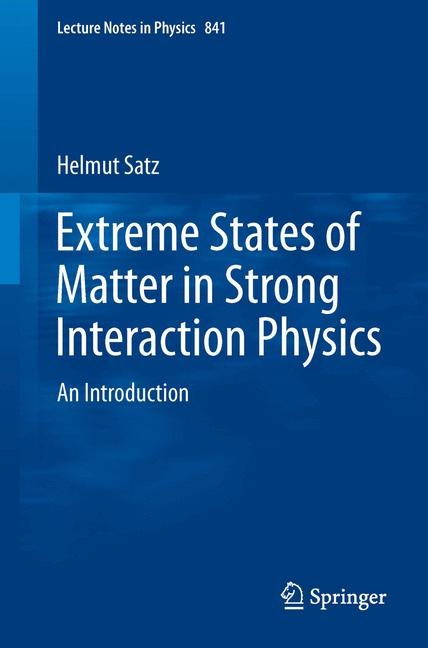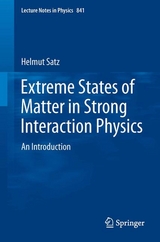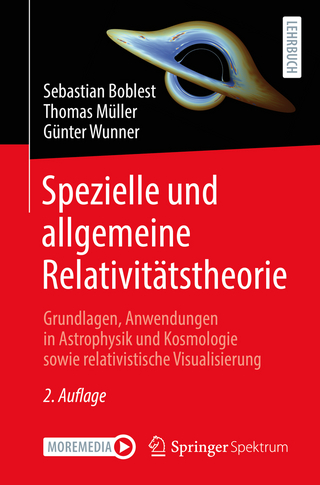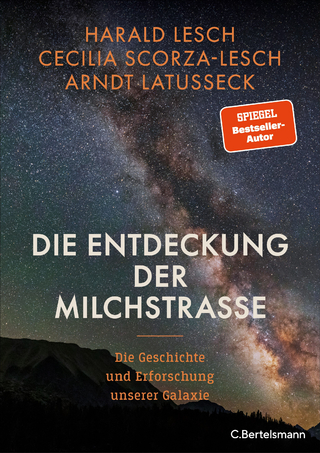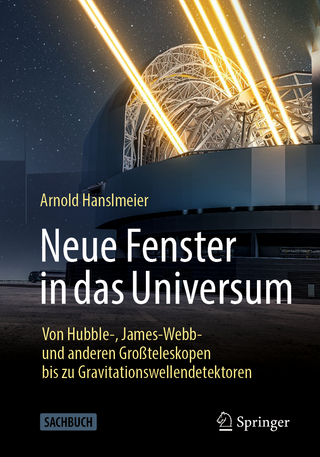Extreme States of Matter in Strong Interaction Physics
An Introduction
Seiten
2012
|
2012
Springer Berlin (Verlag)
978-3-642-23907-6 (ISBN)
Springer Berlin (Verlag)
978-3-642-23907-6 (ISBN)
- Titel erscheint in neuer Auflage
- Artikel merken
Zu diesem Artikel existiert eine Nachauflage
The thermodynamics of strongly interacting matter has become a profound and challenging area of modern physics, both in theory and in experiment. Statistical quantum chromodynamics, through analytical as well as numerical studies, provides the main theoretical tool, while in experiment, high-energy nuclear collisions are the key for extensive laboratory investigations. The field therefore straddles statistical, particle and nuclear physics, both conceptually and in the methods of investigation used.This course-tested primer addresses above all the many young scientists starting their scientific research in this field, providing them with a general, self-contained introduction that emphasizes in particular the basic concepts and ideas, with the aim of explaining why we do what we do.To achieve this goal, the present text concentrates mainly on equilibrium thermodynamics: first, the fundamental ideas of strong interaction thermodynamics are introduced and then the main concepts and methods used in the study of the physics of complex systems are summarized. Subsequently, simplified phenomenological pictures, leading to critical behavior in hadronic matter and to hadron-quark phase transitions are introduced, followed by elements of finite-temperature lattice QCD leading to the important results obtained in computer simulation studies of the lattice approach. Next, the relation of the resulting critical behavior to symmetry breaking/restoration in QCD is clarified before the text turns to the study of the QCD phase diagram. The presentation of bulk equilibrium thermodynamics is completed by studying the properties of the quark-gluon plasma as new state of strongly interacting matter. The final chapters of the book are devoted to more specific topics which arise when nuclear collisions are considered as a tool for the experimental study of QCD thermodynamics.
Helmut Satz, geb. 1936, war von 1971 bis 2001 Professor für Theoretische Physik an der Universität Bielefeld. Sein Forschungsschwerpunkt ist die Physik der ersten Sekundenbruchteile nach dem Urknall. Zusammen mit seinem Schüler Frithjof Karsch machte er Bielefeld zu einem der weltweit führenden Zentren für die Untersuchung von Materie bei extrem hohen Dichten und Temperaturen.
The Analysis of Dense Matter.- The Physics of Complex Systems.- The Limits of Hadron Physics.- From Hadrons to Quarks.- Statistical Quantum Chromodyanamics.- Broken Symmetries.- The QCD Phase Diagram.- The Quark-Gluon Plasma.- The Little Bang.- Probing the Quark-Gluon Plasma.- The Fireball Paradigm.- The Event Horizon of Color Confinement.- Outlook.
| Reihe/Serie | Lecture Notes in Physics ; 841 |
|---|---|
| Zusatzinfo | XIII, 239 p. 116 illus., 20 illus. in color. |
| Verlagsort | Berlin |
| Sprache | englisch |
| Maße | 155 x 235 mm |
| Gewicht | 400 g |
| Themenwelt | Naturwissenschaften ► Physik / Astronomie ► Astronomie / Astrophysik |
| Naturwissenschaften ► Physik / Astronomie ► Atom- / Kern- / Molekularphysik | |
| Naturwissenschaften ► Physik / Astronomie ► Quantenphysik | |
| Naturwissenschaften ► Physik / Astronomie ► Thermodynamik | |
| Schlagworte | Extreme nuclear and quark matter • Hadron-quark phase transition • heavy ion collisions • QCD at Finite Temperature • quark-gluon plasma • Statistical Quantum Field Theory • Thermodynamics of strongly interacting matter |
| ISBN-10 | 3-642-23907-2 / 3642239072 |
| ISBN-13 | 978-3-642-23907-6 / 9783642239076 |
| Zustand | Neuware |
| Haben Sie eine Frage zum Produkt? |
Mehr entdecken
aus dem Bereich
aus dem Bereich
Grundlagen, Anwendungen in Astrophysik und Kosmologie sowie …
Buch | Softcover (2022)
Springer Spektrum (Verlag)
49,99 €
die Geschichte und Erforschung unserer Galaxie
Buch | Hardcover (2023)
C.Bertelsmann (Verlag)
30,00 €
Von Hubble-, James-Webb- und anderen Großteleskopen bis zu …
Buch | Softcover (2024)
Springer (Verlag)
22,99 €
